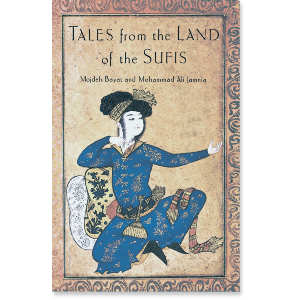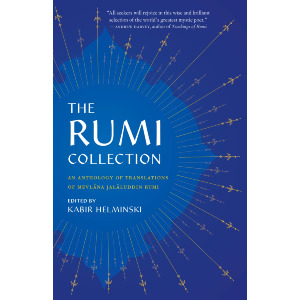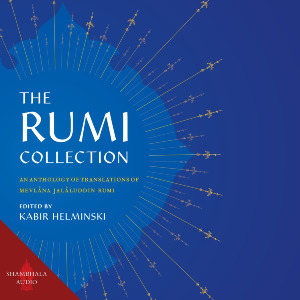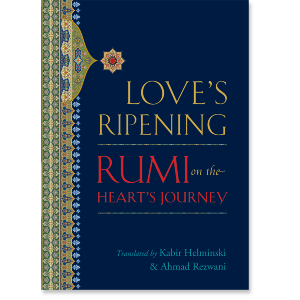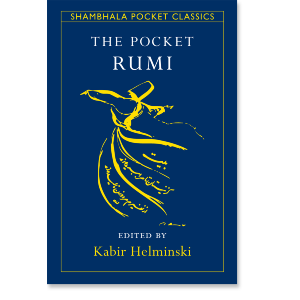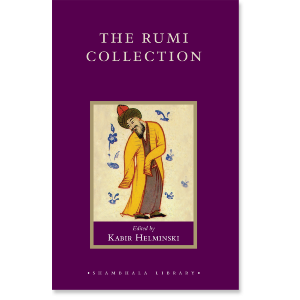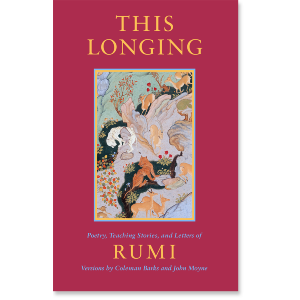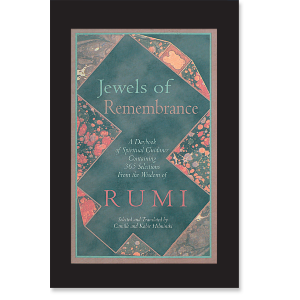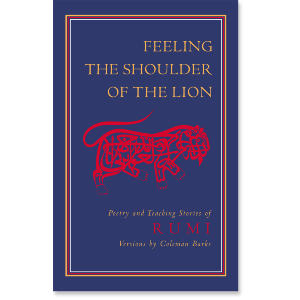An excerpt from Tales of the Land of the Sufis by Mohammad Ali Jamnia andMojdeh Bayat
Everyone who is familiar with Eastern mysticism, particularly with Sufism, has heard of Jalaluddin Rumi, for he is one of the most celebrated and most widely translated Sufi teachers of all times. By the same token; students of poetry, especially those interested in Persian studies, look to Rumi's work as a model for the best poetry in the Persian language. Indeed, the scholars Reynold A. Nicholson and A. J. Arberry described Rumi as the greatest mystical poet of any age. More recently, William Chittick and Annemarie Schimmel have done valuable work in translating and interpreting Rumi's teachings. In addition, gifted poets such as Coleman Barks and Robert Bly, even though they do not read Persian, have created "versions" of Rumi that have done much to popularize his thought among English-speaking audiences. Known by many as Maulana, "Our Master," Rumi is an outstanding figure among Sufi masters. It is said that this astonishing mystic would enter an ecstatic state of intoxication in the marketplace upon hearing the ringing of the blacksmith's hammer on the anvil. He would hear such a sound as harmonized music voicing the name of God-"Allah, Allah" -and would spontaneously whirl around, dancing to the melody he heard. The Order of the Whirling Dervishes, established by Rumi, is now known to many Westerners through its music and dance performances in Europe and the United States.
Rumi's teachings have been valued and used by Sufi masters after him, and are studied in contemporary mystic circles. Not only Sufis, but others as well refer to his teachings for lessons, and those who enjoy poetry are intoxicated by Rumi's magical words. In the following example, translated by Nicholson, the reed symbolizes the human soul, which laments its separation from its origin (God), represented by the reed-bed:
Listen to the reed, how it tells a tale, complaining of separations, Saying, "Ever since I was parted from the reed-bed, my lament hath caused man and woman to moan. I want a bosom tom by severance, that I may unfold the pain of love-desire. Everyone who is left far from his source wishes back the time when he was united with it. In every company I uttered my wailful notes; I consorted with the unhappy and with them who rejoice. Everyone became my friend from his own opinion; none sought out my secrets from within me. My secret is not far from my plaint, but ear and eye lack the light (whereby it should be apprehended). Body is not veiled from soul, nor soul from body, yet none is permitted to see the soul.
RUMI'S LIFE AND TEACHINGS
Since Rumi lived most of his life in Konya, a city in present-day Turkey, the Turks claim him as being Turkish. The Afghans raise another claim, arguing that since this great master was born in Balkh, a city now located in Afghanistan, he must be considered of Afghani origin. Yet most scholars agree that Rumi is Persian. The reason for this is twofold: Balkh, the city in which Rumi was born, was a Persian city at the ·time of his birth, and all of Rumi's books were written in the Persian language. However, Rumi did choose Konya as his place of residence and remained there until his death. Of course, in a sense, place of birth and nationality are of little importance, for the true mystic is universal in spirit.
Jalaluddin Rumi was born on September 30, 1207. His father, Baha'uddin Walad, was a well-known and respected preacher, jurisprudent, and Sufi, whose spiritual lineage was traced to Ahmad al-Ghazzali, a famous Sufi master of an earlier century. Baha Walad was an authority in both exoteric and esoteric Islam. As an exoteric authority, he taught Islamic law (Shari'a) in mosques and other public places; as an esoteric teacher, he met in more private environments with those who sought his teachings.
Although Baha married a member of the royal family, he was opposed to the policies of the ruler, Kharazmshah. The king attended most of Baha's exoteric lessons, but eventually grew jealous of his popularity and suspicious of his teachings, which brought controversy to the kingdom. Thus, when the Mongols invaded Balkh in 1219, Baha with his family left the city that had become so inhospitable to him, to make the pilgrimage to Mecca. No doubt he was aware that they would never see Balkh again.
On their way, they stopped in Nishapur, the hometown of the great Attar, who was by then an old man. Attar accepted the guests warmly-including young Jalal, whose potential greatness he apparently recognized, as seen in this description by Ira Friedlander: "Baha and Attar sat together, drank the customary tea, and spoke of passages in the Koran. Several hours later, the travelers were preparing to depart. As young Jalal walked closely behind his father, Attar turned to one of the dervishes and remarked, 'Look at this peculiar situation; there goes a sea followed by an ocean.'
During that visit, Attar presented Jalal with his Book efSecrets, telling Baha, "Your son will soon be kindling fire in all the world's lovers of God." Attar's writings, teaching the principles of Sufism through stories and fables, would become one of the major influences on Rumi's work.
After the pilgrimage, Baha and his family set out for Asia Minor. On a stop in the city of Lamada, jalal, then twenty-one years old, married Gawhar, the daughter of one of Baha's friends. The Seljuk king, 'Ala'uddin Kayqobad, who was ruling in the nearby city of Konya, became aware of Baha's new place of residence. (Konya was later taken over by the Ottoman Empire.) The king, who respected science and philosophy and promoted scholarly works, wrote to Baha, offering him a place of residence and an official position at the madrasa (university) at Konya. Upon Baha's acceptance, the king received him and his family warmly. Baha took up residence in Konya and stayed there for the next several years. Since Konya (the ancient Iconium) was also called Rum, Jalal adopted the name Rumi as his nom de plume.
Having learned at his father's knee since childhood, Rumi had by this time mastered Arabic grammar, prosody, the Qur'an, jurisprudence, Hadith (the traditions of the Prophet's sayings and deeds), Qur'anic commentary, history, dogmatics, theology, logic, philosophy, mathematics, and astronomy. When his father died in 1231, Rumi, at the age of twenty-four, succeeded to his father's position as teacher.
Rumi is assumed to have become familiar with the principles of Sufism under his father's guidance, although Sufi scholars believe that he did not begin formal Sufi training until 1232, when a highranking student of his father's, Burhanuddin Tirmidhi, came to Konya in hopes of visiting his master. Upon learning of Baha's death, Tirmidhi took on the task of teaching jalal the principles of the Path. The two traveled to Aleppo and Damascus, where Rumi came into contact with one of the most influential Sufi masters of all times, Ibn 'Arabi of Spain. Tirmidhi continued to impart the disciplines of Sufism to Rumi until his death in 1 240.
Rumi remained in his conventional post at the university even though he had become an accomplished Sufi master. In the words of William Chittick, he "had traversed the stations of the Sufi path and realized the direct and immediate vision of God he discusses so constantly in his verses. But, in spite of his spiritual attainments, Rumi's outward life remained the same as it had always been. He assumed the· customary activities and trappings of a staid and honored doctor of the law. Sometimes, he would discuss the spiritual mysteries in his sermons, but he never gave any outward indication that he was any different than other jurisprudents and lawyers for having knowledge of them. "3
Rumi gained widespread respect and _fame as an ordinary professor, and people from all parts of the East came to him for advice and lectures. Probably he would have remained so, if it were not for his encounter with a remarkable spiritual personality, Shamsuddin Tabrizi.
The mysterious Shams first met Rumi in 1244, when Rumi was thirty-eight-an event that changed Rumi's life forever. Had Rumi not met Shams, he might not have written poems at all-and, in fact, Rumi as we know him today might not have existed. As Chittick puts it, Shams's influence "'exteriorized' Rumi's inner contemplative states in the form of poetry and set the ocean of his being into a motion which resulted in vast waves that transformed the history of Persian literature. "4 Shams disappeared after three years, leaving no trace. According to Idries Shah, some Sufis (including Rumi's son, Sultan Walad) "equated Shams with the mysterious Khidhr, the guide and patron of Sufis, who appears and then passes out of normal cognition after transmitting his message."5
Without doubt, the relationship between Rumi and Shams is one of the most extraordinary of spiritual bonds known to history. Not very often is Divine Love manifested externally in a relationship between two humans.6 As a perfect master, Shams brought out the latent perfection within Rumi. It is important, therefore, to learn something of the life of Shams in order to better understand his role in the transformation of Rumi.
SHAMSUDDIN, THE "SUN OF RELIGION"
For the most part, Shams remains a mysterious figure. Of his teachings, nothing remains but one book, The Articles efShams Tabrizi. It consists of a series of talks Shams gave at Sufi gatherings in Konya. Apparently Shams did not write down his thoughts. Much of what has remained of his teachings is known through the recorded observations of Sultan Walad, Rumi's son. There are many poems and tales about Shams, and yet his family background and personal history are for the most part unknown. However, some speculations about his life have been made, based on the available sources.
It has been suggested that Muhammad Malekdad, later given the title Shamsuddin ("Sun of Religion") Tabrizi, was born in the city of Tabriz in Persia in 1148 C.E. In his childhood he showed exceptional traits. Instead of playing, he would attend religious lectures and study the Sufi masters of the past. At an early age he experienced a feeling of yearning, a seeking within himself for a beloved. Since he found no children of his age who understood him, he spent most of his time alone. For this reason, Shams always seemed to be sad.
Shams's parents thought that perhaps his languor was due to a typical youthful wish for something he could not have. On this subject, Shams later said, "They asked me, 'Why are you depressed? Do you want clothes of silver and gold?' I answered, 'No, I wish someone would take away what I already am wearing.' "7 By this, Shams meant that he wished for the garment of egotism to be removed from his soul. What an extraordinary idea for a child to express! Anyone who heard such answers from him could not comprehend the deeper meanings behind his words and must have


